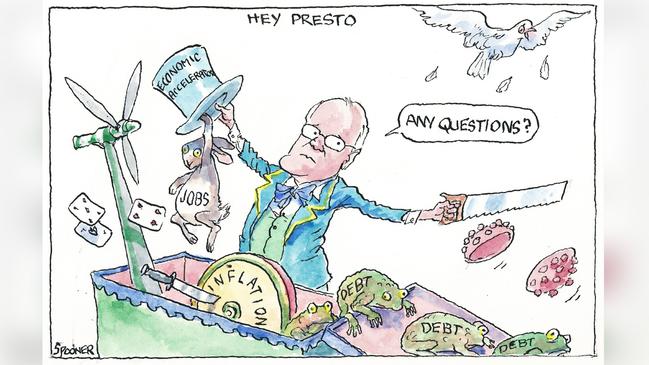Rebuilding voter trust is a key challenge for Morrison

In more ordinary times, Scott Morrison would have every reason to believe a snapshot of the nation’s strong economic vital signs would be sufficient to put his government in good standing with voters in an election year. The Prime Minister was able to rattle off the statistics in his address on Tuesday to the National Press Club. Throughout the pandemic, Australia’s economy has outstripped the performance of most other economies across the world. The triple-A credit rating remains intact, with Australia one of only nine countries to achieve this. Inflation is well below that of other advanced economies. More people are in work today than before the pandemic, and more Australians of working age are in a job than at any time in the nation’s recorded economic history. Unemployment is at 4.2 per cent and youth unemployment is below 10 per cent for the first time since 2008. A $110bn pipeline of infrastructure projects is in the works.
Despite the numbers, Mr Morrison knows the electorate is restless and his political opponents are working hard to present themselves as a credible alternative. Anthony Albanese’s decision to support the construction of a new gas-fired power plant in the Hunter Valley in NSW is a demonstration of political maturity that eluded Bill Shorten. Support for fossil fuels differentiates Labor from the Greens and cuts off a potent future line of attack for the government. Labor no doubt will delight in attempts to characterise Mr Morrison as being out of touch with ordinary people. It’s an odd line of attack, and curious that he would be subjected to a cheap 1990s-era gotcha moment by a hostile media trying to catch him out on the price of bread, petrol and a rapid antigen test when asked. Mr Morrison no doubt has more on his mind than the price of groceries.
The Prime Minister clearly has had time to reflect on the loss of support personally and for his government in Newspoll. His analysis is that the government erred in attempts to will things back to normal ahead of the Christmas period when Omicron struck. It was a bad case of over promise and under deliver. “I think in raising those expectations about the summer that we heightened the great sense of disappointment that people felt,” Mr Morrison said. “In our communications we have to be clear about that. We can’t lift people’s hopes, then disappoint them. I think that’s what happened over the break.” In a bid to reset the relationship, Mr Morrison said: “I understand and acknowledge your frustration, especially with how the global pandemic has played out over this past very difficult summer. And I want to thank Australians. You’ve had to put up with a lot.” Mr Morrison also used the press club address to clear the decks of other past mistakes and to highlight the government’s strengths. On the vaccine rollout, he said he should have acted more quickly to put the program under military command.
Moving forward, Mr Morrison can only hope the Omicron wave passes quickly and the Covid-19 pandemic does not throw up new variants of challenge. Highlighting its good economic performance remains the government’s best strategy. It will be aided by comments by the Reserve Bank of Australia, which has maintained the cash rate at 0.1 per cent and signalled it will not be rushed into lifting rates in response to inflationary pressures. The RBA’s central forecast is for GDP growth of about 4.25 per cent this year and 2 per cent next year. The unemployment rate is expected to fall to below 4 per cent later in the year and to be about 3.75 per cent at the end of next year. Inflation has picked up more quickly than the RBA had expected but the central forecast is for underlying inflation to increase further in coming quarters to about 3.25 per cent before declining to about 2.75 per cent next year, within the bank’s target range. The RBA says it is “committed to maintaining highly supportive monetary conditions” to achieve its objectives of a return to full employment in Australia and inflation consistent with the target. It is “prepared to be patient as it monitors how the various factors affecting inflation in Australia evolve”.
For Labor, the government’s claim to a strong economy does not necessarily put the election out of reach. The last time there was a change in government to Labor, from John Howard to Kevin Rudd, the Australian economy was equally robust. In 2007, RBA assistant governor Malcolm Edey outlined conditions in which the Australian economy was in its 16th year of expansion, the growth rate since 1990 had averaged 3.25 per cent and unemployment was at a 30-year low. The winning strategy for the ALP was to mirror the Coalition on the economy and present Mr Rudd as an economic conservative or “Howard fresh”. It also had the benefit of poor succession planning by the Liberals, claiming Mr Howard would not complete a full term if he won. This is not necessarily the case for Mr Morrison, who used his press club address to highlight his experience, fiscal responsibility and courage to take decisions that stand up for Australia’s interests. It is now clear that, to succeed, a bold and focused Mr Morrison must nourish the everyday connection with voters that helped carry him to what was an unexpected “miracle” win in 2019 as well.

